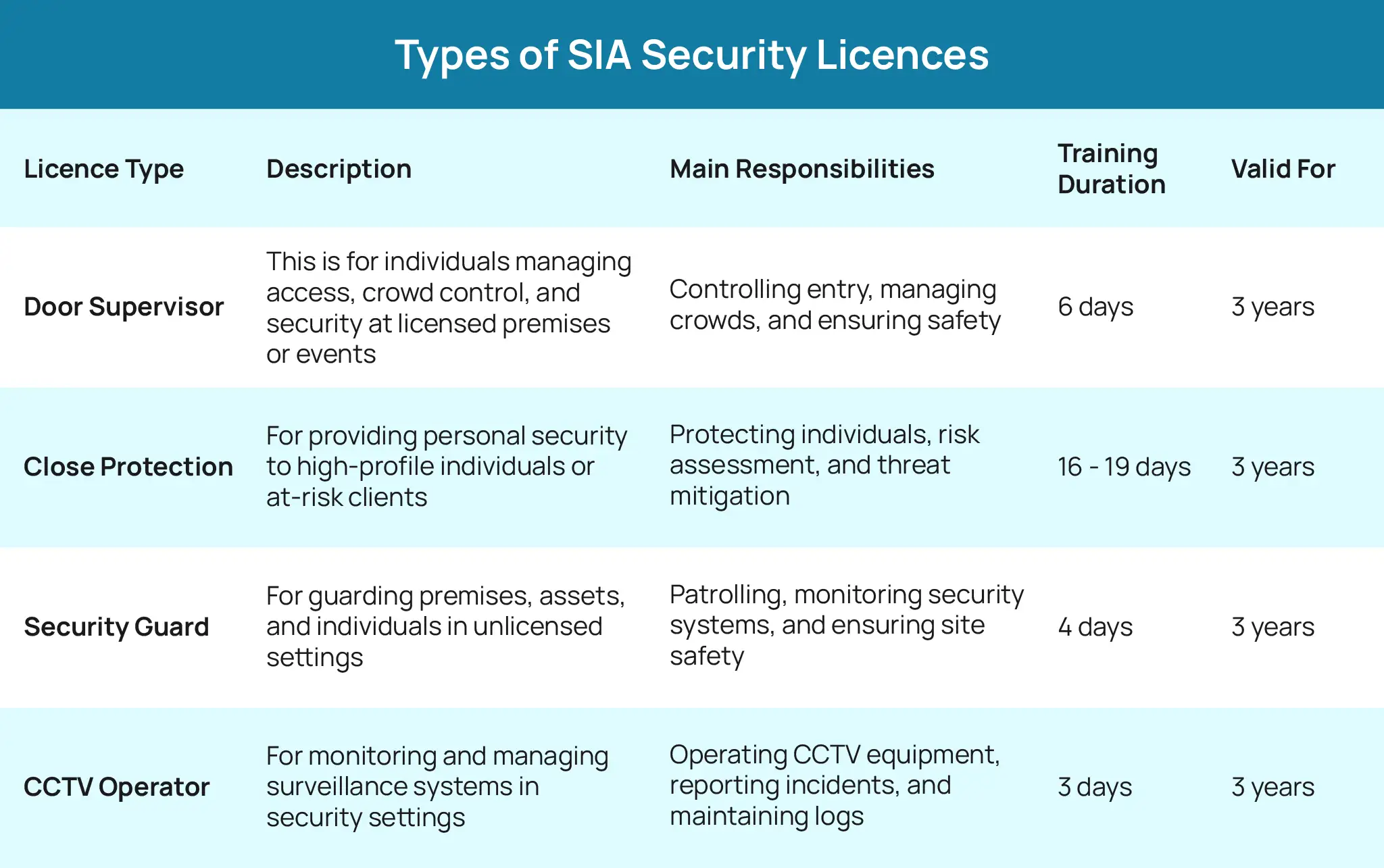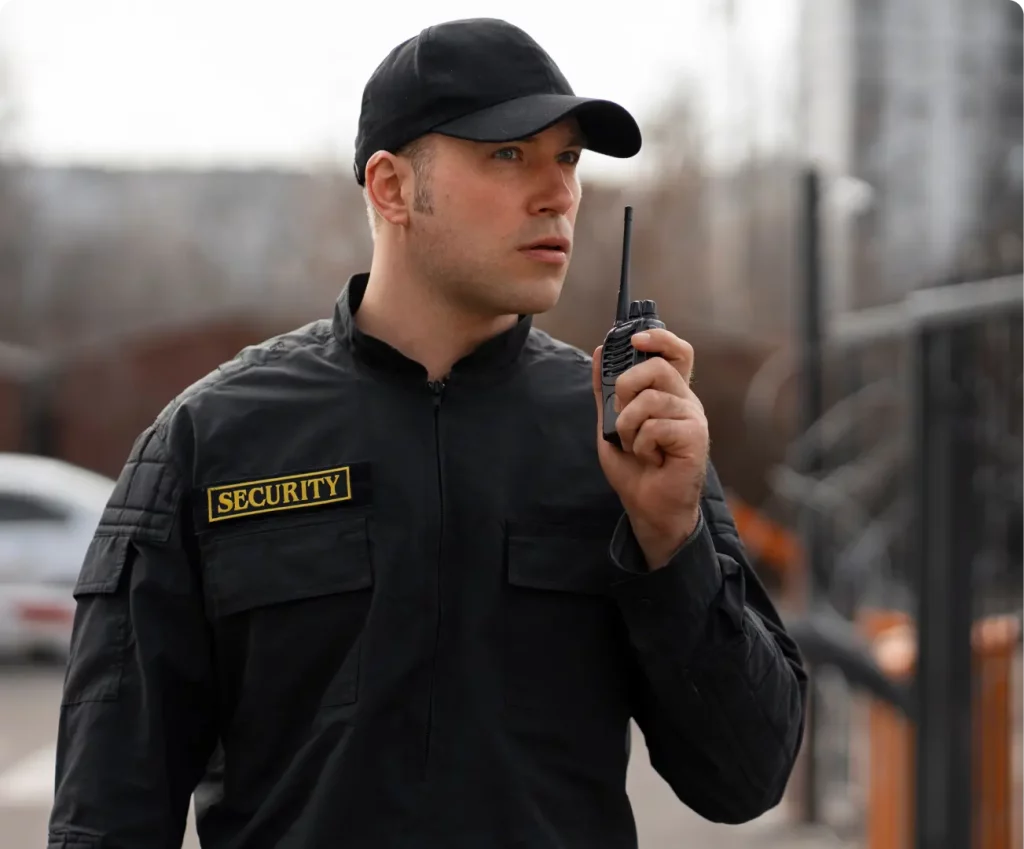The Security Industry Authority (SIA) is the regulatory body responsible for licensing security professionals in the UK. Obtaining the appropriate SIA licence is important whether you’re pursuing a role in security guarding, CCTV operation, or close protection.
Front Line SIA Licence
A front-line SIA license is necessary for active security roles, such as door supervisors, security guards, or CCTV operators. This licence permits direct interaction with the public while performing security duties.

SIA Licences Application Made Simple
SIA licences are for different security jobs like door supervisors, security guards, and CCTV operators.The Door Supervisor Licence manages crowds and entrances, while the Security Guard Licence protects property. If you work with surveillance cameras, you need a CCTV Operator Licence. Taking the right SIA courses will prepare you for the job and help you get licensed easily.
How Much is an SIA Licence?
An SIA licence costs £184, regardless of the type. This fee is applicable to the three-year licence period, and it is paid during the application process. Some employers or training providers may cover this fee on your behalf.
SIA Licence Application
The SIA licence application is done online through SIA website. You’ll be asked to give personal information, evidence of your training and qualifications, and a criminal background check.
SIA Certificate
Once you have finished your SIA training, you will be awarded an SIA certificate. This document proves that you have successfully passed the course and met the training requirements to apply for your licence.
SIA Non-Front Line Licence
The non-frontline SIA licence is given to individuals in supervisory or administrative positions in the security industry. It is required for individuals who are in charge of or overseeing supervising licensable security activities, but not directly participating in security operations.
How Long Does the SIA Criminality Check Take?
The criminality check is one of the most essential steps in the SIA licence application process. This typically takes up to 14 days, but it might also change depending on the situation of the individual and the complexity of the background check.
SIA Licence Types
The SIA offers several licence types, each tailored to a specific role:
- Door Supervisor Licence: For roles involving access control and crowd management.
- Security Guard Licence: For guarding premises and assets.
- CCTV Operator Licence: For monitoring security systems.
- Close Protection Licence: For providing personal security to individuals.

What are the SIA Licence Requirements
To qualify for an SIA licence, you must meet the following requirements:
- Be at least 18 years old.
- Complete the relevant SIA-approved training course.
- Hold a valid first aid certificate.
- Pass a criminal record check.
- Have the right to work in the UK.
What are the Steps to Get an SIA Licence
- Complete the required training for your chosen licence type.
- Obtain a valid first aid certificate.
- Pass the SIA criminality and right-to-work checks.
- Create an account on the SIA website and submit your application.
- Pay the £184 licence fee and await approval.
SIA Right to Work Check
The SIA, as part of the application process, makes a right-to-work check to ensure that you are legally permitted to work in the UK. You are required to produce some form of documentation, such as a passport or biometric residence permit.
SIA Application Form
The SIA application form is available online through the SIA portal. It requires information about your training, criminal record, and personal information. Always make sure that all the information is correct to prevent any delays in the processing.
SIA Licence Renewal
Renewing your SIA licence is generally straightforward, though additional training might be required depending on when you obtain your qualification. If your qualification was awarded after April 2021 or your certificate states “[Awarding Body Name] Level 2 Award in Door Supervision (QCF),” no extra training is necessary.
However, if additional training is required, then you have to undergo a refresher course, such as Top-Up Refresher Training for Door Supervisors, before you renew your licence. You can start the renewal process up to four months before your current licence expires, but the new licence will only become active after the current one has expired.
How Long is an SIA Licence Valid For?
SIA licences are valid for three years from the date of issue. To continue working legally in the security industry, you must renew your licence before it expires.
SIA Licence Fee
The licence cost for all SIA licences is £184. This fee is non-refundable, so ensure you meet all the eligibility requirements before applying.
Conclusion
An SIA licence is the key to a successful career in the security sector of the UK. Whether your intention is to work as a door supervisor, security guard or on CCTV operations, it is important to know the various types of licences, application procedures and requirements. With the right preparation, you can obtain your licence and open up exciting opportunities in the security field.
If you’re ready to take the next step, explore the relevant SIA training courses and ensure you meet all the requirements for your chosen licence type.




